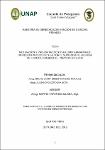| dc.contributor.advisor | Tafur Boullosa, Martín | |
| dc.contributor.author | Ramos Rotalde, Bruno Larry Ernesto | |
| dc.contributor.author | Córdova Soto, Alejandro | |
| dc.date.accessioned | 2017-03-03T16:50:38Z | |
| dc.date.available | 2017-03-03T16:50:38Z | |
| dc.date.issued | 2015 | |
| dc.identifier.uri | http://repositorio.unapiquitos.edu.pe/handle/20.500.12737/4247 | |
| dc.description.abstract | La presente investigación tiene por finalidad demostrar que el dictado de prisión preventiva, en su gran mayoría, afecta el principio-garantía de motivación de las resoluciones judiciales, el tipo de investigación empleada fue la causal explicativa, el método fue: descriptivo, dogmático, inductivo, deductivo, histórico y analítico y el Diseño fue: descriptivo comparativo, los resultados obtenidos responden a la población y muestra propuesta, las resoluciones se obtuvieron de los diversos órganos judiciales; así como las encuestas a profesionales y operadores de derecho. Las dificultades que tuvimos fue al momento de las entrevistas con los denominados operadores de derecho, pues muchos se excusaron de atendernos aduciendo razones de diligencias o tiempo, llegando a las siguientes conclusiones: Al ser la libertad personal, uno de los derechos fundamentales más importantes de ser humano, al lado de la vida, su restricción reviste de suma gravedad, por lo que es necesario e importante rodearla de las máximas garantías jurídicas; empero, del análisis de las resoluciones judiciales y entrevistas realizadas, se verifica que en el dictado de una prisión preventiva no se aplica una adecuada y reforzada motivación, y es que la adopción de una medida limitativa de derechos, en especial, la que restringe la libertad de la persona implica, la exigencia que recubre el peligro procesal y, que justifica la prisión preventiva, debe ser grave y eminente, es decir, que ello implica sostener que dicho peligro debe ser de cierta magnitud y entidad, en otras palabras, que sea objetivamente cierto y el peligro procesal, entonces, debe responder a lo que aparece en los actuados y no ser fruto de una mera sospecha o presunciones subjetivas del magistrado. | es_PE |
| dc.description.abstract | The present investigation has for purpose to demonstrate that the dictation of preventive prison, in its great majority, affects the principle-guarantee of motivation of the judicial resolutions, the type of used investigation it was the causal one explanatory, the method was: descriptive, dogmatic, inductive, deductive, historical and analytic and the Design was: descriptive comparative, the obtained results respond to the population and proposed sample, the resolutions were obtained of the diverse judicial organs; as well as the surveys to professionals and right operators. The difficulties that we had went to the moment of the interviews with the denominated right operators, because many apologized of assisting us adducing reasons of diligences or time, reaching the following conclusions: To the being the personal freedom, one of human being more important fundamental rights, beside the life, their restriction had of supreme graveness, for what is necessary and important to surround it of the maximum juridical guarantees; but, of the analysis of the judicial resolutions and you interview carried out, it is verified that in the dictation of a preventive prison an appropriate and reinforced motivation is not applied, and it is that the adoption of a limitative measure of rights, especially, the one that restricts the person's freedom implies, the demand that recovers the procedural danger and that justifies the preventive prison, it should be serious and eminent, that is to say that implies it to sustain that said danger should be then of certain magnitude and entity in other words that it is objectively certain and the procedural danger, he/she should respond to what appears in those acted and not to be fruit of a mere suspicion or the magistrate's subjective presumptions. | en_US |
| dc.description.uri | Tesis | es_PE |
| dc.format | application/pdf | es_PE |
| dc.language.iso | spa | es_PE |
| dc.publisher | Universidad Nacional de la Amazonía Peruana | es_PE |
| dc.rights | info:eu-repo/semantics/openAccess | es_PE |
| dc.rights | Attribution-NonCommercial-NoDerivs 3.0 United States | * |
| dc.rights.uri | http://creativecommons.org/licenses/by-nc-nd/3.0/us/ | * |
| dc.source | Universidad Nacional de la Amazonía Peruana | es_PE |
| dc.source | Repositorio Institucional - UNAP | es_PE |
| dc.subject | Prisión preventiva | es_PE |
| dc.subject | Motivaciones | es_PE |
| dc.subject | Garantía del debido proceso | es_PE |
| dc.subject | Corte suprema de justicia | es_PE |
| dc.title | Motivación y prisión preventiva como garantía de un debido proceso en el Corte Superior de Justicia de Loreto, durante el período 2011 - 2013 | es_PE |
| dc.type | info:eu-repo/semantics/masterThesis | es_PE |
| thesis.degree.discipline | Derecho y Ciencias Políticas | es_PE |
| thesis.degree.grantor | Universidad Nacional de la Amazonía Peruana. Escuela de Posgrado | es_PE |
| thesis.degree.level | Maestría | es_PE |
| thesis.degree.name | Magister en Derecho con mención en Ciencias Penales | es_PE |
| thesis.degree.program | Regular | es_PE |


